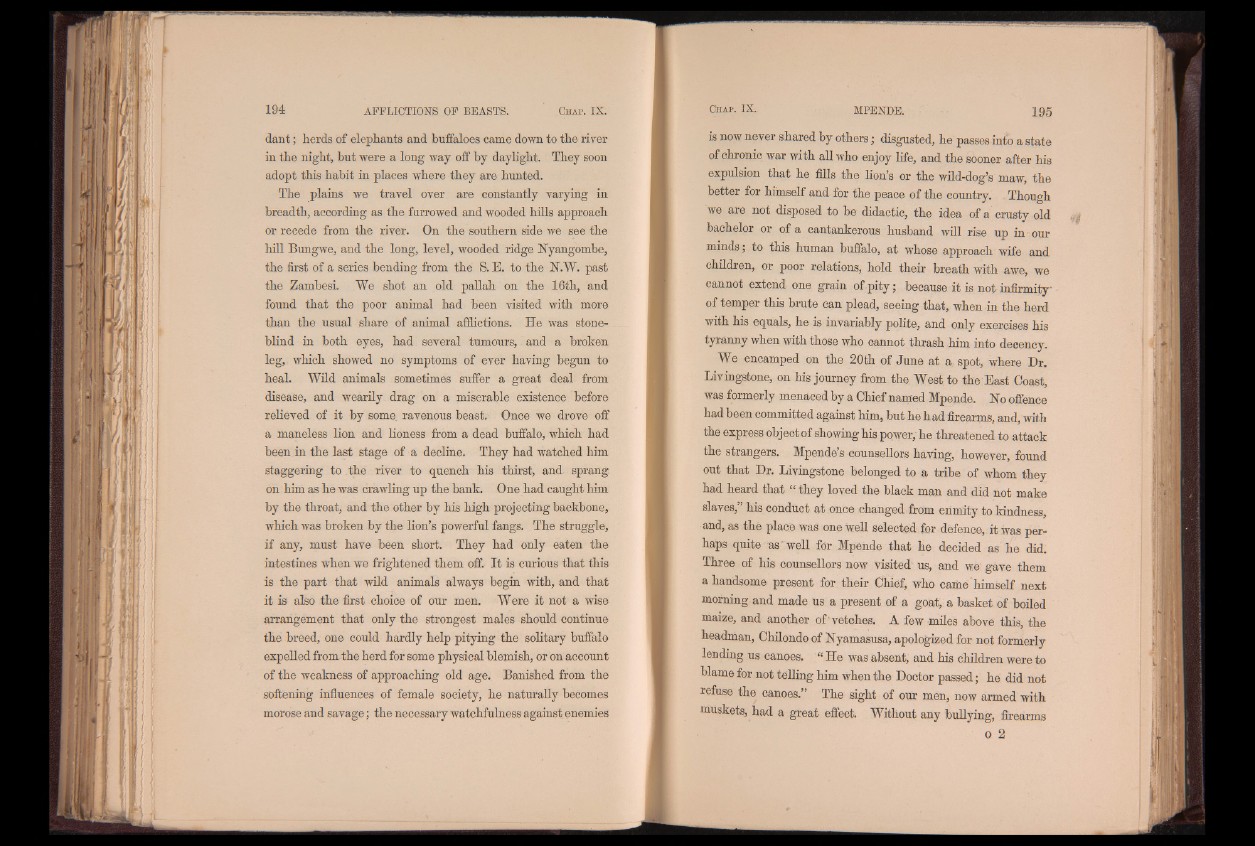
dant; herds of elephants and buffaloes came down to the river
in the night, but were a long way off by daylight. They soon
adopt this habit in places where they are hunted.
The plains we travel over are constantly varying in
breadth, according as the furrowed and wooded hills approach
or recede from the river. On the southern side we see the
hill Bungwe, and the long, level, wooded ridge Nyangombe,
the first of a series bending from the S. E. to the N.W. past
the Zambesi. We shot an old pallah on the 16th, and
found that the poor animal had been visited with more
than the usual share of animal afflictions. He was stone-
blind in both eyes, had several tumours, and a broken
leg, which showed no symptoms of ever having begun to
heal. Wild animals sometimes suffer a great deal from
disease, and wearily drag on a miserable existence before
relieved of it by some ravenous beast. Once we drove off
a maneless lion and lioness from a dead buffalo, which had
been in the last stage of a decline. They had watched him
staggering to the river to quench his thirst, and sprang,
on him as he was crawling up the bank. One had caught him
by the throat, and the other by his high projecting backbone,
which was broken by the lion’s powerful fangs. The struggle,
if any, must have been short. They had only eaten the
intestines when we frightened them off. I t is curious that this
is the part that wild animals always begin with, and that
it is also the first choice of our men. Were it not a wise
arrangement that only the strongest males should continue
the breed, one could hardly help pitying the solitary buffalo
expelled from the herd for some physical blemish, or on account
of the weakness of approaching old age. Banished from the
softening influences of female society, he naturally becomes
morose and savage; the necessary watchfulness against enemies
is now never shared by others ; disgusted, he passes into a state
of chronic war with all who enjoy life, and the sooner after his
expulsion that he fills the lion’s or the wild-dog’s maw, the
better for himself and for the peace of the country. Though
we are not disposed to be didactic, the idea of a crusty old
bachelor or of a cantankerous husband will rise up in ■ our
minds; to this human buffalo, at whose approach wife and
children, or poor relations, hold their breath with awe, we
cannot extend one grain of pity; because it is not infirmity
of temper this brute can plead, seeing that, when in the herd
with his equals, he is invariably polite, and only exercises his
tyranny when with those who cannot thrash him into decency.
We encamped on the 20th of June at a, spot, where Dr.
Livingstone, on his journey from the West to the East Coast,
was formerly menaced by a Chief named Mpende. No offence
had been committed against him, but he had firearms, and, with
the express object of showing his power, he threatened to attack
the strangers. Mpende’s counsellors having, however, found
out that Dr. Livingstone belonged to a tribe of whom they
had heard that “ they loved the black man and did not make
slaves,” his conduct at once changed from enmity to kindness,
and, as thè place was one well selected for defence, it was perhaps
quite as well for Mpende that he decided as he did.
Three of his counsellors now visited us, and we gave them
a handsome present for their Chief, who came himself next
morning and made us a present of a goat, a basket of boiled
maize, and another of vetches. A few miles above this, the
headman, Chilondo of Nyamasusa, apologized for not formerly
lending us canoes. “He was absent, and his children were to
blame for not telling him when the Doctor passed ; he did not
refuse the canoes.” The sight of our men, now armed with
muskets, had a great effect. Without any bullying, firearms
o 2